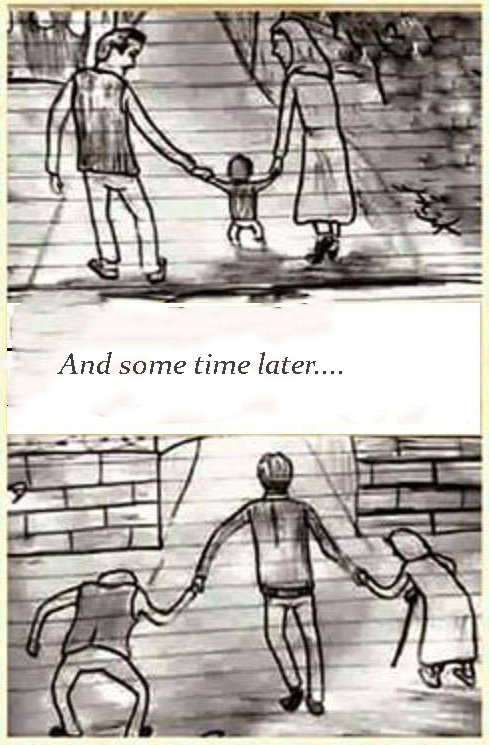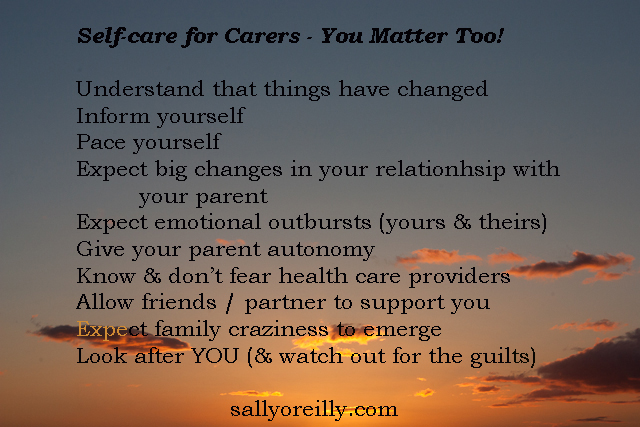I guess it’s my age, but I’ve noticed personally and professionally that caring for elderly parents is a common theme in life recently. Finding oneself in the unfamiliar role of caring for a parent has its rewards of course, but it can also be draining, isolating, saddening, even traumatic.
It ain’t easy, that’s for sure.
Recent studies confirm what people living this already know – caring for elderly relatives can be bad for your health.
As we age as a society we see an increase in incidence of vascular and other dementias, Alzheimers, Parkinson’s and other debilitation age-related conditions. We are more likely now than ever before to witness the gradual decline or disappearance of a loved one, and this hurts us, and them, very, very deeply. (The good news for you and me is that the rate of dementias is actually decreasing so, assuming we stay off the smokes and watch our diets, we can expect a healthier old age than our parents).
If you are a carer then you know that caring triggers a range of difficult emotions – sadness, grief, disappointment, anger, helplessness, resentment, guilt. And it’s particularly difficult to process these feelings when so many other life demands like work and/or children and/or friends are also begging for your finite (and they are finite) resources and attention.

Many carers report feel quite insane while navigating this difficult period – I’ve come to learn that, grim as that sounds, it’s normal. If you are reading this you may be in the midst of this trying period and so I urge you to take your time reading on: it’s lengthy, it’s explicit and some of it might trigger you emotionally.
Meanwhile here’s a summary so you know where I’m going with this:

Some sanity-saving steps you can take:
1. Try to understand and accept that things have changed: When a parent starts to decline things change drastically. One of the first and most difficult emotional changes for you will likely be the reversal of roles from ‘the supported’ to ‘the supporter’. Sometimes this change is gradual – you might notice a little cognitive slip occasionally, a jumbled sentence, a forgotten meal, tiredness, things you can almost deny to yourself for a little while until there is real risk to your parent’s safety. Sometimes this change is sudden – a stroke, an accident. Living in denial of these changes is a short term comfort in which most of us will indulge, but ultimately it doesn’t serve us well.
If you notice a change in your parent’s wellbeing, mention it as soon as possible to a medical professional. It is unlikely that things will improve, and being realistic about this fact will help support and prepare you for what is to come.
2. Inform yourself: Google your old person’s condition (once you have established what it is with the help of a GP and /or geriatrician). Avoid the temptation to google without this diagnosis (google strikes fear into the hearts of most and so we need to use it wisely!) Find out what local supports are in place and be aware that this will mean talking to people about what is happening. This is a natural, albeit at times, horrific life stage, but there need be no shame.
Shame and embarrassment will not serve you or your loved one well, and at worst might prevent you both from accessing the support you need and deserve.
3. Pace yourself: Again, this depends on the nature of your old person’s decline. As a general rule though it is wise to prioritise and remind yourself that everything you want to be in place will most assuredly not be in place when you want it. Things can take an almost intolerable amount of time. There will be appointments, assessment, forms, negotiating, clarifying, explaining (repeatedly and through tears) and it can all be utterly exhausting.
4. Expect big changes in your relationship with your parent: As they near the end of their life and feel vulnerability and fear, possibly for the first time, your parent may start to relate to you differently. You might find they are more expressive to you, more open. Or you may find that they are more abusive towards you, that their existing ‘crazy’ ante is upped. Often carers have hopes around relationships with difficult parents that a previously non existent bond might form – but I caution you against clinging to this. We tend to think of old people as warm and cuddly and harmless, but in the absence of an epiphany, an abusive young person will likely be an abusive old person. And so approach (or not) with the same caution as previously if your relationship has a difficult history.
5. Be ready for outbursts (yours and theirs): Your parent is experiencing a change for which they cannot possibly be fully prepared. They may have witnessed their own parents’ decline and may have been dreading this stage of their lives for years. Or they may be utterly shocked by this new and changing situation.There will likely be outbursts of rage, anger, sadness, resentment directed at themselves, their friends, or at you. You may find yourself upset in front of them in ways you never have been. I hope you can let that be OK. It can be useful to remember that all rage is fear or sad in disguise.
What you are witnessing is the ultimate loss in progress – the loss of the self. Mood swings are to be expected as you and your parent habituate.
6. In as much as is possible and safe, give your person autonomy: This will help ease their anxiety around loss of control and dignity. Asking them for advice, even if you don’t take it, is another way to engage your old person and preserve and enhance their feeling of usefulness. Engage them in conversations that are based in the past. Reminiscence therapy is a real thing.
One issue that many find difficult is that the parent may not want their child to bathe or help them in the toilet. Listen to their concern around this, and try not to take it personally if they don’t want that kind of contact with you. It’s not about you, it’s about them not being ready to let go of their parenting caregiving role.
7. Know and don’t be scared of your health care providers: Building a relationship with community nurses, GPs and carers is vital and enormously helpful. There are many incredibly caring and competent individuals out there who do fantastic work – and I am truly in awe of them. Unfortunately though, for differing reasons, it doesn’t always go well. It may simply not be a good fit, or at very worst, the person looking after your old parent might be dishonest or abusive. Don’t be afraid to monitor the carer and check in at unexpected times. And if you notice something amiss, you are entitled to complain. Many people are afraid of complaining – especially in Ireland I think. The sense of vulnerability around care is huge and all pervasive, particularly if you are managing this without family support. However, you do have a right to good care, and you are allowed to state yours and your old person’s needs.
Equally, be OK with encouraging, praising and acknowledging what is good. There will always be good. Then everyone wins.
8. Allow your friends and/or partner to support you: These people have chosen to be in your life and will likely want to support you, but may not know how. If we allow support and clearly ask for what we need, no matter how small, we feel better. And your old person might also want your partner and / or friends to be involved, particularly if, as often happens, their own friends start becoming unavailable through choice or fear of their own debilitation.
9. Expect family craziness to emerge with a vengeance: Your family has now changed irreversibly. You will each have a range or reactions to this, and individual responses can vary greatly. Old fights can reemerge, new alliances formed, old ones disintegrate. It is a truly testing time for relationships and how your family manages this will inform the next few years. Be careful and mindful of this. Be aware of what role(s) you take on, and what your personal priorities are and will be. Know that if you take more than your ‘share’ of responsibility, the other(s) will allow that to continue, even if they are aware of the unfairness of it all.
What we allow will always continue – #TipForLife
10. Look after yourself and watch out for the guilts. Talk to friends, cry, laugh, walk run, play games, draw, develop a Netflix addiction – do whatever gives you time out (in a balanced healthy way of course!). Now is not the time for guilt – you are doing nothing wrong if you take breaks or feel resentful that you are working so hard here. It is normal to feel this, even to wish for the impending death to come sooner – for the suffering, if there is any, to end. It’s OK to think these thoughts, it really is.
You need care too, perhaps now more than ever before. And you deserve it.
This is a stage, and it’s not permanent. You might be privileged to find that there are wonderful intimate and joyful moments with your parent that you never dreamed possible. Remember these, live them and cherish them. You are caring for a vulnerable human being, it’s a precious and sometimes beautiful thing.
We don’t value old age as we should – maybe this is your chance.
Here is a link to the HSE section for older adults and Age Action Ireland can be reached here.

Great post. You might have been reading my mind. Going through hell at moment and going through gamut of emotions every day. My comfort is to say to myself ” this too will pass”. I want to feel at the graveside thst I did my best. Thank you.
Hi Una, I”m sorry to hear of your situation. Mind yourself well, warmly, Sally